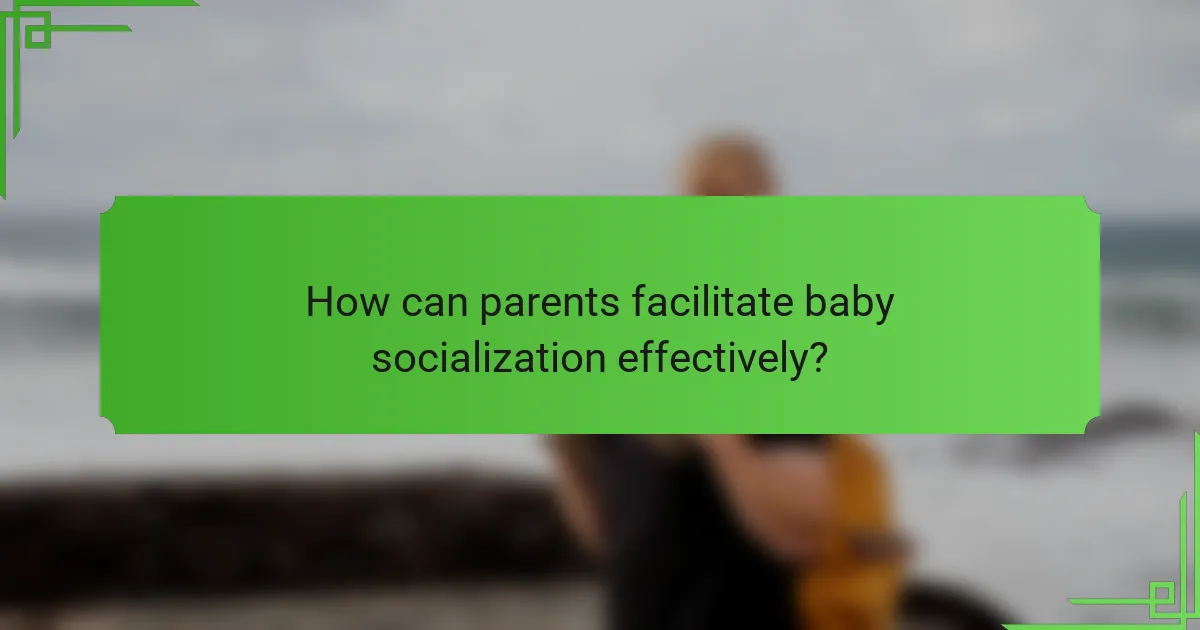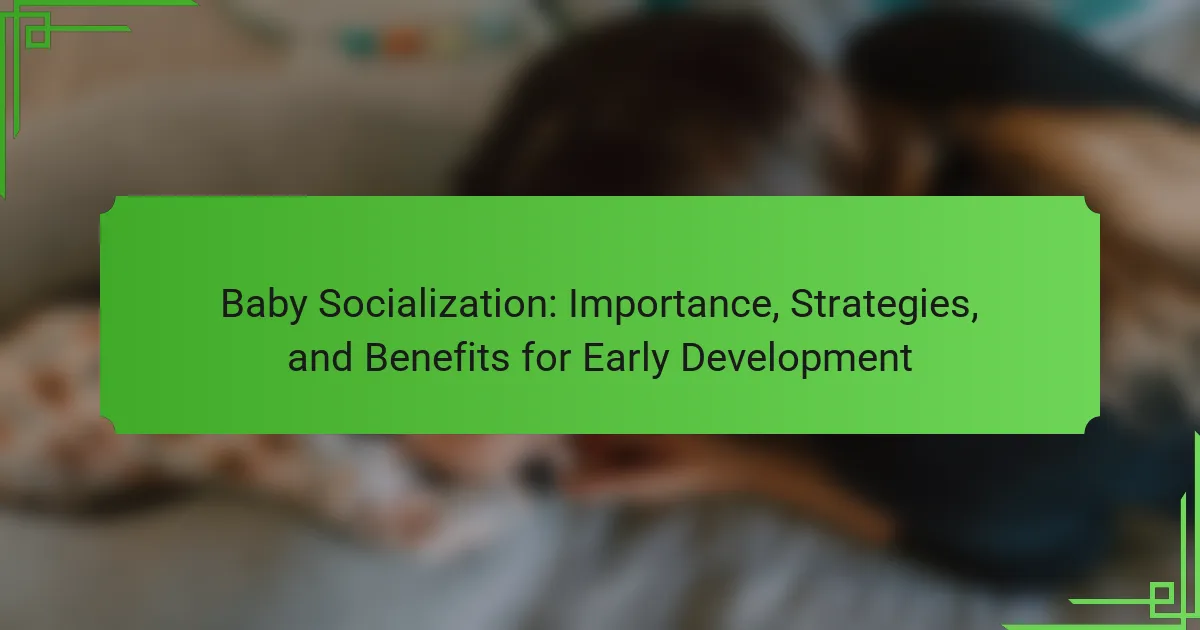Baby socialization is the process through which infants learn to interact with others, encompassing communication skills, emotional understanding, and social behaviors. Early social experiences significantly influence cognitive and emotional development, with research indicating that positive interactions in infancy lead to enhanced social skills later in life. This article explores the importance of baby socialization, effective strategies for parents to facilitate interactions, and the various benefits that arise from these social experiences, including improved language development, emotional regulation, and problem-solving skills. Understanding the critical role of socialization in early development can help parents foster their child’s social competence and confidence.

What is Baby Socialization?
Baby socialization is the process through which infants learn to interact with others. This includes developing communication skills, emotional understanding, and social behaviors. During this period, babies observe and mimic the actions of caregivers and peers. They begin to recognize social cues and develop attachments. Research indicates that early social experiences can influence cognitive and emotional development. For instance, a study published in the journal “Child Development” shows that positive social interactions in infancy lead to better social skills later in life. Thus, baby socialization is crucial for healthy development.
Why is Baby Socialization important for early development?
Baby socialization is important for early development because it fosters essential social skills. These skills include communication, empathy, and cooperation. Engaging with peers helps babies learn to express emotions and understand social cues. Research indicates that social interactions can enhance cognitive development. For example, a study published in the journal “Child Development” found that socially engaged infants demonstrate better problem-solving abilities. Furthermore, socialization contributes to emotional regulation, which is crucial for mental health. Early social experiences can also lay the groundwork for future relationships. Overall, baby socialization is vital to holistic development in early childhood.
What are the key milestones in baby socialization?
Key milestones in baby socialization include several developmental stages. At around 2 months, babies begin to smile socially. This indicates their first interaction with others. By 6 months, they start to recognize familiar faces. This recognition fosters a sense of security. At 9 months, babies engage in joint attention. They look at objects and then at people to share interest. By 12 months, they exhibit social referencing. Babies look to caregivers for cues in uncertain situations. At 18 months, they begin to show empathy. They may comfort a crying peer. By age 2, toddlers engage in parallel play. They play alongside other children, learning social skills. These milestones highlight the progression of social skills in early development.
How does socialization impact emotional development in babies?
Socialization significantly impacts emotional development in babies. Through interactions with caregivers and peers, babies learn to recognize and express emotions. These experiences help them develop emotional regulation skills. For example, responsive caregiving fosters secure attachment, which is crucial for emotional stability. Research shows that babies exposed to positive social interactions exhibit better emotional understanding. A study published in the journal “Child Development” found that socialization enhances empathy and social skills in infants. Thus, socialization is essential for healthy emotional growth in early childhood.
What are the primary strategies for effective baby socialization?
Engaging in regular playdates is a primary strategy for effective baby socialization. Playdates allow babies to interact with peers. These interactions help develop social skills. Exposure to different environments is also essential. Taking babies to parks or community events promotes socialization. Encouraging shared activities fosters teamwork and communication. Reading books together can introduce babies to social concepts. Additionally, modeling positive social behaviors is crucial. Parents and caregivers should demonstrate sharing and empathy. These strategies collectively enhance a baby’s ability to socialize effectively.
How can parents promote social skills in their babies?
Parents can promote social skills in their babies by engaging them in interactive play. Interactive play encourages turn-taking and sharing, which are essential social skills. Parents should use toys that require cooperation, such as blocks or puzzles. These activities help babies learn to communicate and express their emotions. Additionally, parents can model positive social interactions by demonstrating greetings and polite behavior. Research shows that babies learn through imitation, making parental behavior crucial in social development. Consistent social exposure, such as playdates or group activities, further enhances these skills. Engaging in responsive communication also fosters social understanding and emotional regulation.
What role do playdates and group activities play in socialization?
Playdates and group activities are essential for socialization in early childhood. They provide opportunities for children to interact with peers. Through these interactions, children learn to share, cooperate, and communicate. Social skills are developed as they navigate group dynamics. Playdates also expose children to diverse personalities and behaviors. This exposure enhances empathy and understanding. Research indicates that children who engage in regular playdates show improved social competence. A study by Ladd and Price (1987) found that peer interactions positively affect emotional and social development. Overall, playdates and group activities contribute significantly to a child’s social growth.

What benefits does baby socialization provide?
Baby socialization provides essential benefits for emotional and cognitive development. It enhances social skills by allowing babies to interact with peers and caregivers. These interactions promote language development through exposure to varied vocabulary and communication styles. Socialization also fosters emotional regulation as babies learn to understand and respond to others’ emotions.
Research indicates that babies engaged in social activities show improved problem-solving skills. A study published in the Journal of Child Development found that socialized infants develop stronger attachment styles. Additionally, socialization experiences can lead to increased confidence in social settings. Overall, baby socialization is crucial for building foundational skills that contribute to lifelong social competence.
How does baby socialization enhance cognitive skills?
Baby socialization enhances cognitive skills by facilitating interaction and communication with others. These interactions stimulate brain development through exposure to diverse social cues. Babies learn to recognize emotions and intentions during social exchanges. This recognition fosters empathy and problem-solving abilities. Engaging with peers and caregivers encourages language acquisition. Language skills are crucial for cognitive development and academic success. Research indicates that socialized infants show improved memory and attention skills. A study by H. Hirsh-Pasek et al. (2015) highlights that social interactions significantly boost cognitive growth in early childhood.
What specific cognitive skills are developed through social interaction?
Social interaction develops several specific cognitive skills. These skills include communication, problem-solving, and critical thinking. Communication skills improve as children learn to express their thoughts and feelings. Problem-solving abilities are enhanced through collaborative play and negotiation with peers. Critical thinking is fostered when children engage in discussions and debates. Research indicates that social interaction significantly impacts cognitive development during early childhood. According to a study by Vygotsky, social interaction is essential for cognitive growth. It emphasizes the role of social context in learning processes.
How does socialization influence language development in babies?
Socialization significantly influences language development in babies. Through interactions with caregivers and peers, babies are exposed to language patterns and vocabulary. These social exchanges facilitate the learning of sounds, words, and sentence structures. Babies learn to associate words with meanings through context and repetition. Engaging in conversations encourages them to practice vocalization. Studies show that children who experience rich social interactions demonstrate advanced language skills. Research from Hart and Risley (1995) found that the quantity and quality of verbal interactions impact vocabulary growth. Socialization thus plays a crucial role in shaping a baby’s linguistic abilities.
In what ways does baby socialization support emotional regulation?
Baby socialization supports emotional regulation by facilitating the development of social skills and emotional understanding. Interacting with caregivers and peers helps infants learn to recognize and respond to emotions. This process enhances their ability to express feelings appropriately. Research indicates that babies who engage in social play show improved emotional responses. For example, a study by Brown et al. (2020) found that infants exposed to varied social interactions exhibited better self-regulation skills. Additionally, socialization provides a safe environment for babies to practice coping strategies. These experiences contribute to their overall emotional resilience as they grow.
What techniques can parents use to help babies manage emotions?
Parents can use several techniques to help babies manage emotions. One effective method is to provide a calm and nurturing environment. Consistent routines help babies feel secure. Parents should also model emotional regulation. This teaches babies how to express feelings appropriately. Another technique is to label emotions during interactions. For example, saying “You seem sad” helps babies understand their feelings. Comforting touch, like holding or rocking, can soothe babies in distress. Engaging in playful activities can promote positive emotions. Lastly, responding promptly to a baby’s needs fosters trust and emotional security. These techniques are supported by research indicating that emotional support aids in emotional development.
How does socialization contribute to resilience in babies?
Socialization contributes to resilience in babies by fostering emotional connections and social skills. These connections help babies learn to navigate challenges. Engaging with caregivers and peers enhances their ability to cope with stress. Research indicates that babies who experience positive social interactions develop a stronger sense of security. This security lays the groundwork for resilience. Studies show that early socialization can lead to better emotional regulation later in life. Babies learn to trust others, which is crucial for facing difficulties. Overall, socialization equips babies with essential tools for resilience.

How can parents facilitate baby socialization effectively?
Parents can facilitate baby socialization effectively by providing opportunities for interaction with other children. Regular playdates allow babies to engage and learn from peers. Group activities, like baby classes, foster social skills through shared experiences. Parents should model positive social behaviors, such as sharing and taking turns. Engaging in conversations with their baby encourages language development and social cues. Observing and responding to other babies helps them understand social dynamics. Research indicates that social interactions in early childhood are crucial for emotional and cognitive growth. According to the American Academy of Pediatrics, early socialization enhances communication skills and emotional regulation.
What are some practical tips for encouraging social interaction?
Encouraging social interaction can be achieved through several practical tips. Organize playdates to facilitate interactions among babies. Create a safe and stimulating environment that promotes exploration. Use toys that encourage cooperative play, such as building blocks. Engage in group activities like singing or storytelling to foster connection. Encourage parents to model social behaviors, as children learn by imitation. Attend community events to expose babies to diverse social settings. Limit screen time to promote face-to-face interactions. Research shows that early social interaction significantly contributes to emotional and cognitive development in infants.
How can parents create a supportive social environment for their babies?
Parents can create a supportive social environment for their babies by engaging in regular social interactions. Frequent interactions with caregivers promote emotional security. Parents should also expose their babies to various social settings. This includes playdates and family gatherings. Such exposure helps babies develop social skills early on. Furthermore, responsive parenting is crucial. Responding to a baby’s cues fosters trust and attachment. Research shows that secure attachments lead to better social outcomes later in life. Parents should also model positive social behavior. Babies learn by observing their caregivers’ interactions. Encouraging interactions with peers can enhance social development. Overall, a rich social environment contributes significantly to a baby’s growth.
What common challenges do parents face in baby socialization?
Parents face several common challenges in baby socialization. One challenge is limited exposure to other children. Babies benefit from interactions with peers for developing social skills. Another challenge is parental anxiety about social settings. This anxiety can hinder parents from taking their babies to playgroups or gatherings. Additionally, parents may struggle with understanding developmental milestones. Misunderstanding these milestones can lead to unrealistic expectations for their baby’s social behavior. Lastly, cultural differences can impact socialization practices. Different cultures have varying norms regarding child interactions. These challenges can affect a baby’s ability to socialize effectively.
What resources are available to assist parents in baby socialization?
Resources available to assist parents in baby socialization include parenting classes, playgroups, and online forums. Parenting classes often cover social development and interaction techniques. Playgroups provide opportunities for babies to interact with peers, fostering social skills. Online forums allow parents to share experiences and advice on baby socialization. Additionally, local community centers may offer workshops focused on early childhood socialization. Research indicates that early socialization positively impacts emotional and cognitive development. Engaging in these resources can enhance a child’s ability to connect with others.
How can community programs aid in baby socialization efforts?
Community programs can significantly aid in baby socialization efforts by providing structured environments for interaction. These programs often include playgroups, parenting classes, and community events. Such settings encourage babies to engage with peers and caregivers. Interaction with other babies fosters essential social skills. Programs also offer resources for parents to learn about child development. Research indicates that early social experiences contribute to emotional and cognitive growth. For instance, a study by the American Academy of Pediatrics highlights the importance of socialization in fostering secure attachments. Overall, community programs create opportunities for babies to connect and learn in supportive settings.
What online resources offer guidance on baby socialization?
Online resources that offer guidance on baby socialization include websites like the American Academy of Pediatrics (AAP) and Zero to Three. The AAP provides evidence-based information on child development and social skills. Zero to Three focuses on early childhood development, offering resources for parents on socialization techniques. Additionally, Parenting.com features articles and tips on fostering social skills in infants. These platforms are reputable and provide valuable insights into effective socialization strategies for babies.
Baby socialization is the process through which infants learn to interact with others, developing essential communication skills, emotional understanding, and social behaviors. This article explores the importance of baby socialization for early development, highlighting key milestones and its impact on emotional and cognitive growth. It also outlines effective strategies for parents to promote social skills, including engaging in playdates and modeling positive behaviors. Additionally, the article discusses the benefits of socialization, such as enhanced language development, emotional regulation, and resilience, while providing resources and tips for parents to facilitate this crucial aspect of childhood development.
